

Top priority for HR? Survey shows for ‘best in class’ organizations, it’s the future of work. Despite what many futurists are saying, one survey finds most organizations are not ready for the future of work – yet.
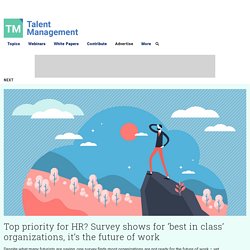
The global pandemic has had a significant impact on the future of work. One big trend many are dealing with is the rapid pivot to remote work and people leveraging technology in new and innovative ways. How Organizations Can Become Project-Based In The Future Of Work. Co-Founder and Chief Talent Officer at FlexTeam and Chief Experience Officer at Liquid.
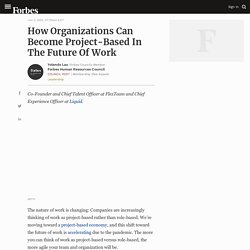
The nature of work is changing: Companies are increasingly thinking of work as project-based rather than role-based. We’re moving toward a project-based economy, and this shift toward the future of work is accelerating due to the pandemic. The more you can think of work as project-based versus role-based, the more agile your team and organization will be. How leadership style must change for the new world of work. The reset of the global workforce to a hybrid model now seems inevitable.
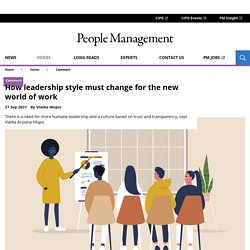
Financial Times’ Andrew Hill summed up the current situation as: “Technology companies: remote and flexible. Financial services companies: office-centric and more rigid. Everyone else: hybrid.” Various studies are emerging around what employees and leaders need now. Remote Work Should Be (Mostly) Asynchronous. The pandemic accelerated many trends, from streaming, e-commerce, and food delivery platforms to the widespread adoption of remote work.
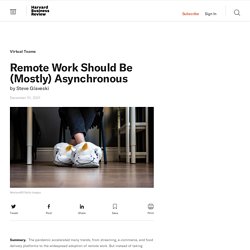
But instead of taking advantage of this opportunity to improve how we work, most organizations simply... Digital transformation should be a means to an end, but it often gets mistaken for an end in itself. This is partly why 70% of all digital transformation efforts fail — because they’re done purely for the sake of going digital without full consideration of the bigger picture. The pandemic accelerated many trends, from streaming, e-commerce, and food delivery platforms to the widespread adoption of remote work.
Les quatre métacompétences du futur. Bureau de demain : l’architecture du choix. Building mental resilience for the future of work. HR leaders must invest in mental health resources and continue to have open and honest conversations with employees around mental wellbeing.
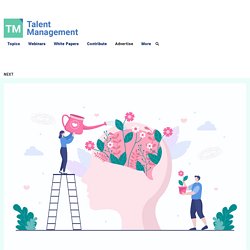
In March 2020, we witnessed a massive transition that would transform the future of work. Workplaces immediately shifted to remote work — in some cases, over the course of a weekend —to protect the health and safety of their workers. Now, as we approach the next phase of this evolution, organizations and employees are faced with another ripe opportunity to redefine work for the better. As a chief people officer, I’ve managed diverse teams globally and believe building mentally resilient workplaces starts with creating an employee-first framework.
Hybrid Work Models Have Consequences for Professional Firms. Shaping the future with 3D mapping. On the Line: A video series on the worker-employer relationship From the 2021 Deloitte Global Human Capital Trends Special Report. Open Management: Better work for a better world (1 December 2021) by Rob England and Cherry Vu. What Space Missions Can Teach Us About Remote Work. Already a member?
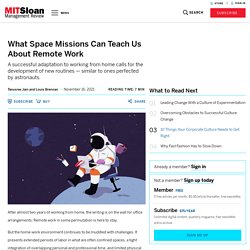
Sign in Not a member? Sign up today. Hybrid or not hybrid? That's not the question. Reimagining Office Density Can Ease Return-to-Work Resistance. Already a member?
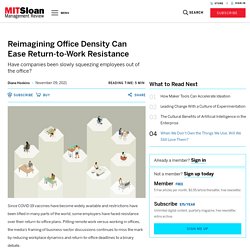
Sign in Not a member? Sign up today Member Free. The Big Reset Playbook - Deskless Workers. Developing new work models. Broaden work and the workforce Instead of atomizing jobs into pieces, an alternative is to broaden them so that the focus is on the broad outcomes to be achieved or problems to be solved.
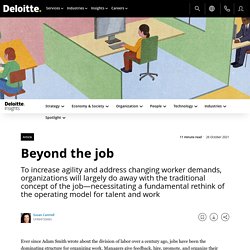
With latitude in defining the “how” of work in pursuit of broad objectives, employees get the opportunity to take on bigger, more integrated roles and responsibilities that often cross functional boundaries and enable them to develop new skills and gain experience. For decades, businesses have gradually embraced worker empowerment, with the move to DevOps, agile, intrapreneurship, teams of teams with distributed control and centralized coordination, self-management, edge-centric decision-making, and “teal organizations” all signaling a direction away from rigid jobs. Is your organization ready for hybrid work? Rethinking Assumptions About How Employees Work. Like what you’re reading?
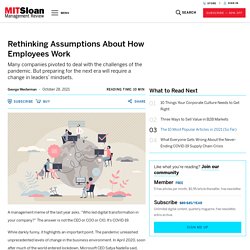
Join our community Member Free 5 free articles per month, $6.95/article thereafter, free newsletter. The Future Of Work Is Employee Well-Being. As remote working blurs the line between work and life, HR leaders are prioritizing employee well-being and mental health.
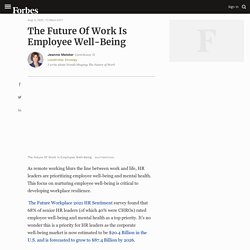
This focus on nurturing employee well-being is critical to developing workplace resilience. The Future Workplace 2021 HR Sentiment survey found that 68% of senior HR leaders (of which 40% were CHROs) rated employee well-being and mental health as a top priority. It’s no wonder this is a priority for HR leaders as the corporate well-being market is now estimated to be $20.4 Billion in the U.S. and is forecasted to grow to $87.4 Billion by 2026. Will Relaxed Rules About Hybrid Work Improve Productivity and Performance? Topics MIT SMR Strategy Forum The MIT SMR Strategy Forum offers monthly insights from academic experts on pressing strategy issues related to business, management, technology, and public policy.
More in this series. The Remote Work Gap: How to Add Flexibility in a Non-Flexible Industry or Job. This is one of the hottest conversations in the workplace, today, and no, I’m not talking about the most challenging hiring environment we’ve ever seen before. I’m talking about remote work. If you work for a software company, chances are you’re one of many people who is working a remote or hybrid schedule these days. But if you’re in some other industries, you’re likely feeling some different emotions because you may not have the option of working virtually. While it’s easy to get caught up in the discussion of the companies in the headlines, the truth is many employers (and their workers) don’t have the option of working remotely. Their work could be:
Creating Flex Work Policies … When Everyone Has Different Needs. The great attrition stems from a great disconnect. Overwhelmed by Employee Turnover? Have Stay Conversations. Story Highlights Nearly half of U.S. workers are watching or hunting for job opportunitiesRobust retention strategies should include stay conversationsThese proactive conversations do more than reduce employee turnover Picture your star performer, that champion employee who exceeds expectations and embraces challenges enthusiastically. Podcast:Tim Creasey: CHANGE, How Did the Entire Business World Move to Work From Home in 1.5 Days? on Science of CX.
5 Keys to a Hybrid Employee Onboarding Process. Employee onboarding in the remote era is just as important as it was before 2020, when the WFH trend transformed workplaces around the globe. How Employee Onboarding Impacts Engagement and Productivity Onboarding sets the tone for the rest of the employee’s relationship with a company since it forms an employee’s first impression of the company. During onboarding, employees, managers, and teams determine whether new hires are the right fit for the organization. As a result, the onboarding experience will impact the employee’s dynamics with the company for the remainder of their tenure. A positive experience will positively impact metrics such as: Re-Entry Stress Is Contagious. Here’s How to Protect Yourself. Protecting against re-entry stress is something all managers need to be mindful of, since absorbing direct reports’ emotions will only fuel greater angst and perpetuate a vicious cycle of fear.
The author offers strategies to avoid being an... “I can’t fathom how I’ll go back to working in the office. I just finished fully adjusting to working from home,” my client Alana, a vice president of marketing, said with a troubled look on her face. How to Prepare for the Future of Work. Why companies are ditching the word ‘hybrid’ A 3-Step Return-to-Work Strategy for Companies Coming Out of the Pandemic. Return to work in a psychologically safer office. No More Mr. Remote Guy. The Future of Flexibility at Work. Is the 4 Day Work Week a Good Idea? Survey report: How the Great Resignation will shape HR and the Future of Work.
The new normal. Questions Leaders Must Ask to Create a Workplace of the Future. Exploring Remote Work Productivity. Rethinking the ways we look at productivity in a Work from Anywhere world - How to evaluate remote worker productivity post-pandemic. The future of work: Managing three risks of the hybrid workplace. How to Adapt Performance Management for Remote and Hybrid Workplaces. The future of work: Three steps toward an inclusive workplace. Report: Rebooting the digital workplace - Data can drive new ways of working remotely and in the office. The role of communication in a hybrid workplace. Microsoft and LinkedIn share latest data and innovation for hybrid work. Who Is Driving the Great Resignation? When Everyone’s Quitting … Except You. On the future of organizations. The Next Normal Emerging stronger from the coronavirus pandemic. Making the Great Attrition the Great Attraction.
Key questions Prosci Hybrid Workplace. Finding the right technologies to keep remote workers engaged. Managing Introverts and Extroverts in the Hybrid Workplace. The Future of Work: Tools for Preparing Your Team for the Future (17 August 2021) by Harvard Business Review, Deborah Grayson Riegel, Brian Kropp, Ranjay Gulati and Joseph B. Fuller. How to Prepare for the Future of Work. Three Research-Backed Tips for Successfully Implementing a Hybrid Work Policy. How to manage an increase in flexible working requests. Never going back to the office? Facebook has an app for that. The future of work: Seizing the opportunities of the new normal. Don’t Force People to Come Back to the Office Full Time. Which Hybrid Work Model Is Best for Your Business? Create Your Hybrid Workplace Strategy With 7 Questions. Your future work experience is Smart Work Anywhere Straight talk about hybrid and the future of work. How to Redesign Your Office for Hybrid Work.
4 myths about hybrid work managers need to stop believing. The Next Rules of Work: The Mindset, Skillset and Toolset to Lead Your Organization through Uncertainty (31 August 2021) by Gary A. Bolles. Remote Working Statistics [Updated August 2021] Future-Ready Talent & HR. MIT SMR’s special collection on remote/hybrid workforce management. The Remote Work Reality vs. the Remote “Dream” of WFH. The Future of the Office: Work from Home, Remote Work, and the Hard Choices We All Face (10 August 2021) by Peter Cappelli. Getting real about hybrid work. The New World of Work is Here. Staying Visible When Your Team Is in the Office…But You’re WFH. Why hybrid offices won't work. What’s In It for Me?
Don’t Lose the Democratizing Effect of Remote Work. Chief Learning Officer - CLO Media. Fostering a Culture of Belonging in the Hybrid Workplace. The end of the office. How to boost engagement in a hybrid workplace. Hybrid work: Perspectives. Figuring Out Social Capital Is Critical for the Future of Hybrid Work. The Next Rules of Work: The Mindset, Skillset and Toolset to Lead Your Organization through Uncertainty (5 August 2021) by Gary A. Bolles. Livre blanc: des stratégies pour contrer la pénurie de talents. On-demand webinar: Getting Hybrid Work Right: New Work Models. Redefining employee performance for a post-COVID era. How 15+ tech companies are transitioning back to the office (or not) 5 Predictions About the Future Workforce and Workplace. Hybrid Work vs. Remote Work vs. Onsite Work – Pros and Cons.
5 Pitfalls to Avoid When Managing the Hybrid Workforce. The worker-employer relationship disrupted If we're not a family, what are we? On a sustainable organisational future. On-demand webinar: Artificial Intelligence, Change Management, and the Future of Work. 4 Strategies for Building a Hybrid Workplace that Works. Return as a muscle: How lessons from COVID-19 can shape a robust operating model for hybrid and beyond. New Ways of Working in the Company of the Future. The Future Of Work Is Change. How Does the Future of Work Look?